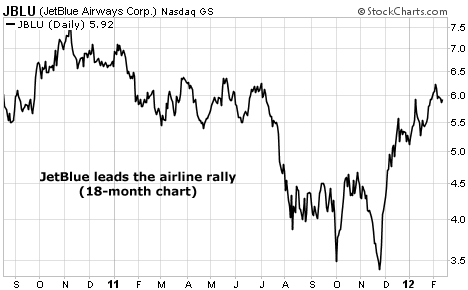| Home | About Us | Resources | Archive | Free Reports | Market Window |
The Only Sure Way to Get Rich in StocksBy
Wednesday, February 15, 2012
Most people think Warren Buffett became the richest investor in history – and one of the richest men in the world – because he bought the right "cheap" stocks.
Legions of professional investors tell their clients they're "Dodd and Graham value investors... just like Warren Buffett."
The truth of the matter is entirely different. And if you want to prosper during the inflationary crisis I see coming, it's critical you understand that difference...
Until 1969, Buffett was a value investor, in the style of David Dodd and Benjamin Graham. That is, he bought stocks whose stock market capitalization was a fraction of their net assets. Buffett figured buying $1 bills for a quarter wasn't a bad business. And it's not.
But it's not nearly as great of a business as investing in safe stocks that can compound their earnings for decades. Take shares of Coca-Cola (NYSE:KO), for example – they're the best example of Buffett's approach.
Buffett bought his Coke stake between 1987 and 1989. It was a huge investment for him at the time, taking up about 60% of his portfolio.
Later, other investors would bid up the shares to stupid levels. Coke was trading for more than 50 times earnings by 1998, for example. But Buffett never sold. It didn't matter to him how overvalued the shares were, as long as the company kept raising the dividend. In 2011, Coke paid out $1.88 in dividends per share. Adjusted for splits and dividends already paid, Buffett paid $3.75 per share for his stock in 1988.
Thus, Coke's annual dividend, 24 years later, now equals 50% of his total purchase price. Each year, he's earning 50% of that investment – whether the stock goes up or down.
How could Buffett have known Coke would be a safe stock... and that it would turn into a great investment? Well, like Einstein said famously about God, Buffett doesn't roll dice. He only buys "sure things."
In his 1993 shareholder letter, Buffett wrote about his Coke investment and his approach – buying stable companies with the intention of holding them forever so their compounding returns would make a fortune.
Buffett is looking for companies that produce high annual returns when measured against the company's asset base and that require little additional capital. He is looking for a kind of financial magic – companies that can earn excess returns without requiring excess capital. He's looking for companies that seem to grow richer every year, without demanding continuing investment.
In short, the secret to Buffett's approach is buying companies that produce huge returns on tangible assets without large annual capital expenditures. He calls this attribute "economic goodwill." I call it "capital efficiency."
These kinds of returns shouldn't be possible in a rational, free market. Fortunately, people are not rational. They frequently pay absurdly high retail prices for products and services they love.
Buffett explained how another of his holdings, See's Candy, earned such high rates of return on its capital in his 1983 annual letter, which I urge everyone to read. In explaining See's ability to consistently earn a high return on its assets (25% annually, without any leverage), Buffett wrote...
That's the whole magic. When a company can maintain its prices and profit margins because of the value placed on its product by the purchaser rather than its production cost... that business can produce excess returns – returns that aren't explainable by rational economics.
Those, my friend, are exactly the kind of companies you want to own.
And... you especially want to own these stocks during inflationary periods. As things get more and more expensive in the coming years, capital-efficient companies will have to buy less than other companies, on average.
The result will be that inflation tends to lift their profits, rather than reduce them. In the inflationary crisis I see ahead, this is the single-best way for stock investors to grow wealth, rather than lose it.
Regards,
Porter Stansberry
Further Reading:
"Sure thing" investments are often considered "boring"… But as income investor Dan Ferris says, they're unbeatable…
"These companies are at the tops of their industries," Dan writes. "They gush free cash flow and pay out ever-increasing dividends like clockwork… And if you're investing for income, they'll beat the stock market, year after year." Read more about them here: How to Find Extraordinary Income Streams That Always Go Up.
Market NotesA PICTURE OF THE BIG AIRLINE RALLY When airline stocks rally, they rally hard. That's the idea behind today's chart...
Late last year, concerns over the global economy helped hammer airline stocks 30%-40% in just months. After the fall, we pointed out how the beaten-up sector could stage a big "bad to less bad" rebound rally. It's simply the nature of this "boom and bust" sector.
Keep in mind: Airlines are legendarily bad long-term investments. They sport thin profit margins, they're subject to wild swings in fuel costs, and they require lots of capital expenditures to keep the businesses running. This wild business model causes big swings in airline stock prices. You just have to buy them when conditions look dark and everyone is bearish... and sell when things look bright and everyone is bullish. We noted JetBlue (JBLU) as a buying candidate.
As you can see from today's chart, JBLU is performing as expected. When we identified the stock's potential back in October, it traded for $4.50. It has since rallied to $6 per share (a 33% gain). JBLU's competitors have staged similar rallies. We state again... when airline stocks rally, they rally hard.
 |
In The Daily Crux
Recent Articles
|


